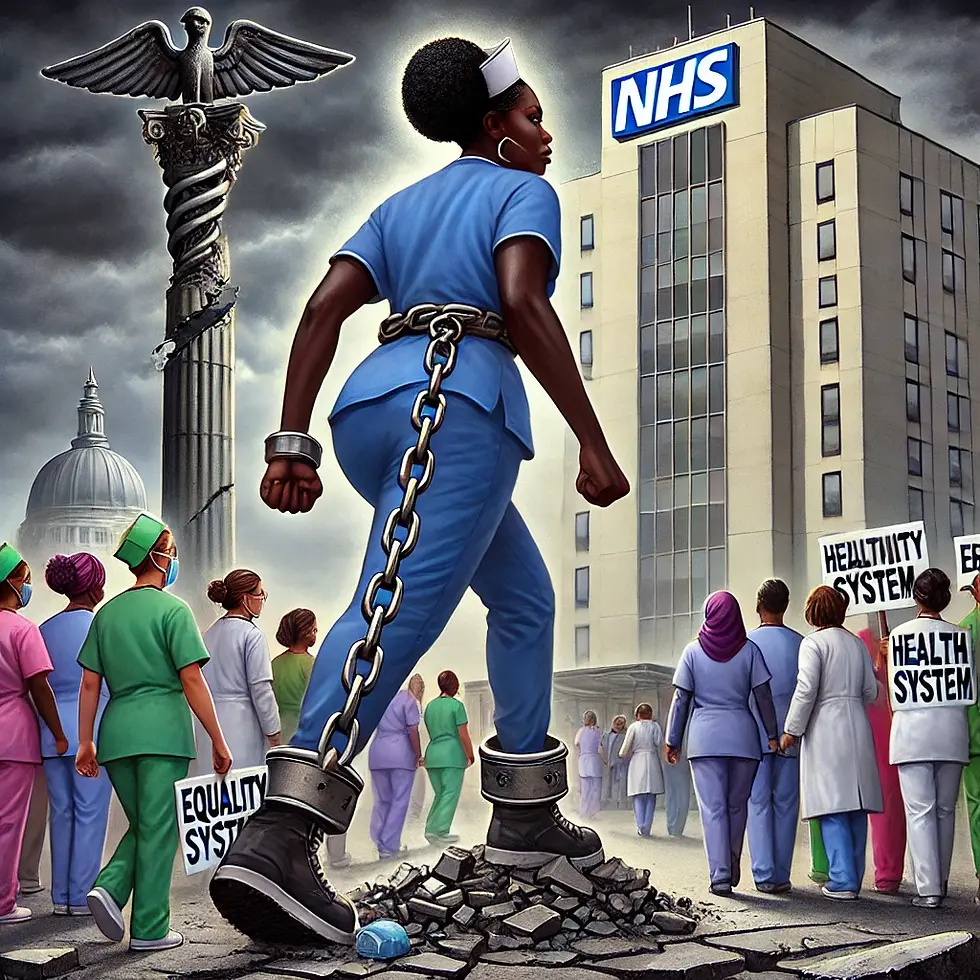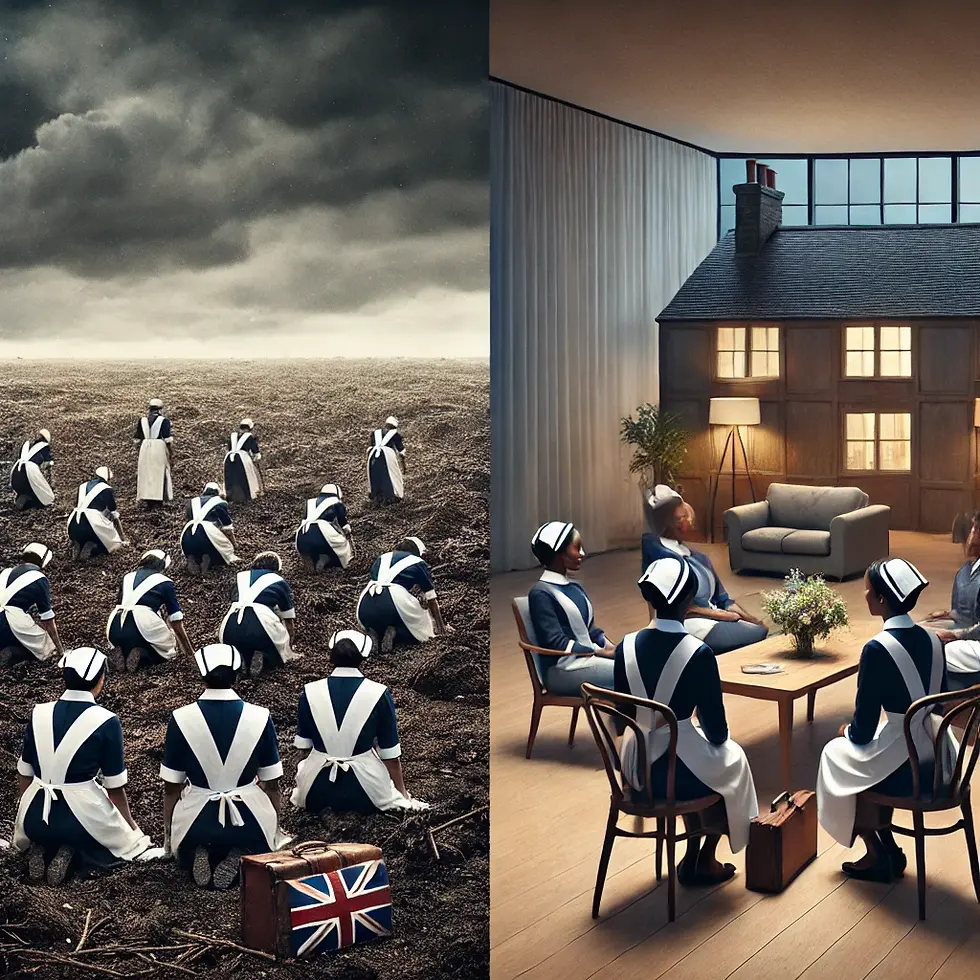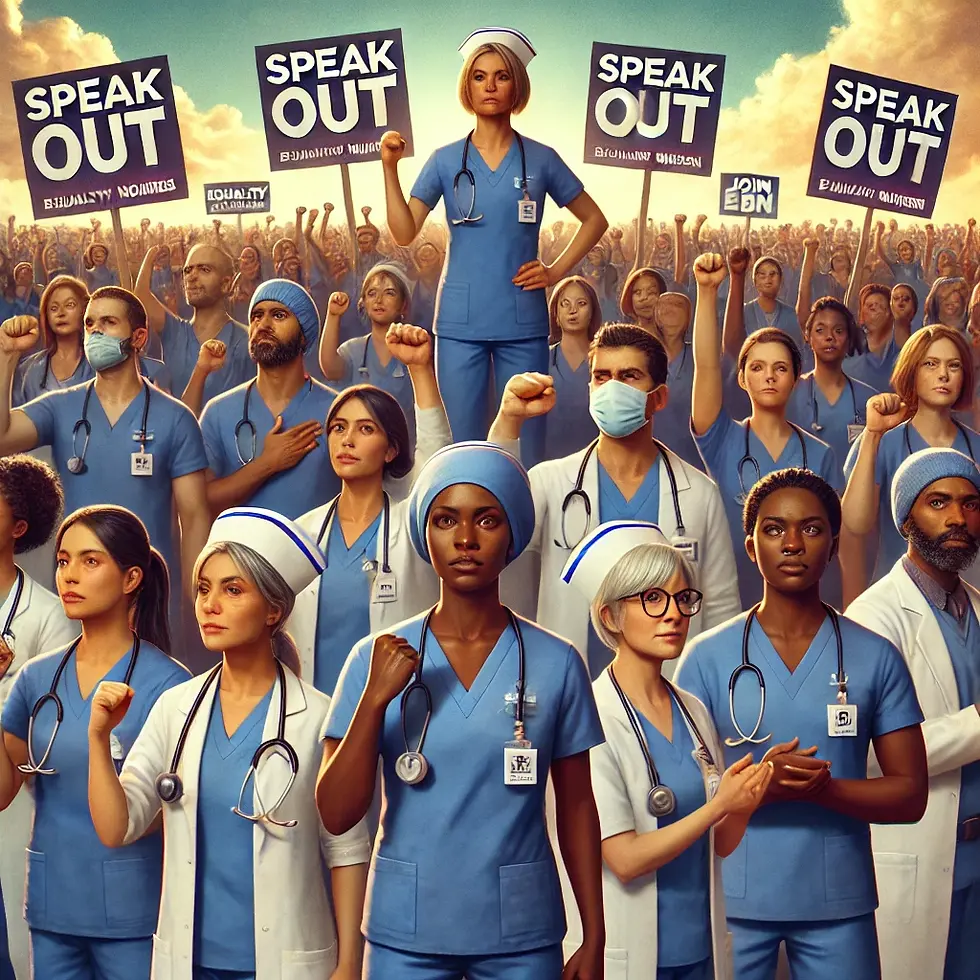The House Negro concept is alive and kicking in the NHS
- Anika Ola

- Oct 12, 2024
- 4 min read
We've all heard the stories — the whispers in the break room, the knowing glances during staff meetings. But the reality is much harsher than any of us want to admit. For too long, many of us in healthcare, especially Black nurses, midwives and carers have found ourselves trapped in a system designed to hold us back.
What hurts the most is when some of us, those who've reached higher positions of power, such as the bands eight and above, don't fight for the change we desperately need.

Take the disciplinary process as an example. We've all witnessed how disproportionately Black and minority ethnic healthcare workers are sanctioned.

A minor documentation error might result in a quiet chat and some retraining for a white nurse. However, for a Black nurse, midwife or carer the same mistake could lead to a full-blown investigation, followed by suspension or a referral to the Nursing and Midwifery Council (NMC). It's a pattern we see time and time again: Black nurses and midwives being over-scrutinised, disproportionately disciplined, and pushed out while their white colleagues, making the same mistakes, face lighter consequences or none at all.

The modern-day house negro isn't a concept from a long-forgotten history book; it's alive and well in today's healthcare system.
In nursing, this idea manifests in ways that continue to harm those in lower bands, many of us on the frontlines. The nursing staff who see the inequality firsthand, who feel the weight of racism in every shift, and who fight to keep our heads above water in a system designed to hold us down.
Black nurses and midwives are more likely to be referred to the NMC for fitness-to-practise concerns, often for issues that could have been handled at a local level. Meanwhile, white nurses are given multiple chances, even after serious incidents. These referrals hang over us like a dark cloud, threatening our careers and livelihoods. And while some of us are fighting these referrals, we look to those in higher positions — nurses of colour who have made it to band eight or above — and wonder why they are not speaking out against this injustice.
Like their historical counterparts, they may work in better conditions, receive better treatment, and enjoy more privileges than the rest of us. But their silence speaks volumes. In their pursuit of acceptance and survival, they've aligned themselves with a racist system that continues to mistreat the rest of us. The same system that harshly sanctions Black nurses delays our career progression and forces us out when we raise concerns about unfair treatment.
It's not just about personal experience — it's about statistics. Research shows that Black nurses and midwives are disproportionately disciplined and referred to the NMC for fitness-to-practise hearings. A white nurse or midwife can be involved in a significant medication error, and it's brushed under the carpet with a warning. But if a Black nurse or midwife makes a similar mistake, the process is formal, aggressive, and often escalates to the highest level.
These nurses and midwives in leadership positions, some of whom are Black, are celebrated as examples of diversity. They are held up as proof that the system is fair, and everyone has an equal chance. They are often chosen to sit on a disciplinary panel giving a false sense of security to the Black nurse facing charges - But deep down, we know the truth: this is tokenism dressed up as leadership.

These nurses are given just enough power and responsibility to keep them quiet, to make them feel like they've made it, while the rest of us struggle with the day-to-day realities of discrimination.
We need leaders who remember where they came from and stand with us, not the system. Leaders who don't accept token roles but demand real change. Leaders who challenge the unfair disciplinary processes, the disproportionate sanctions, and the racially biased referrals to the NMC.
It's about changing the whole structure, tearing down the walls that keep so many of us out.
There's a reason why some of these nurses and midwives watch and stay silent. They're afraid - afraid of losing their positions, fearful of being seen as "too political," scared of being pushed out after finally making it to the top. But that fear keeps us all in chains.
The fear of losing privilege, of being excluded once again, leads these nurses to protect the very system that has harmed them and continues to harm the rest of us. It's like watching someone fight to protect a burning house because they have a small corner in it. But the house is on fire, and it's burning all of us.
The NHS loves to talk about diversity. We've all sat through those unconscious bias training sessions, watched those videos about inclusion, and seen the posters promoting equality.
But what's changed? Not enough.
These initiatives, while well-intentioned, are just a Band-Aid on a deep wound. Real change doesn't come from superficial reforms. Real change comes from dismantling the structures that uphold racism, challenging the systems that keep us out, and fighting for more than just representation. We need real power, not just a seat at the table but a voice that matters.
And that requires more than just surface-level actions — it requires us to confront the truth about the modern-day house negro and the role some Black workers play in keeping these systems alive.
But there's hope. There are still so many of us fighting — fighting for fairness, fighting for equality, fighting for the chance to be seen and heard. These are the modern-day field nurses, the ones on the frontlines who refuse to accept the scraps we've been given, the ones who stand up and say, "No more."
Organisations like Equality for Black Nurses (E4BN) are leading this fight. They see and hear us and are doing the work to ensure that our voices are heard and amplified. They know that real change comes from challenging the system, not protecting it.
It's time for us all to rise. It's time for us to demand more. And it's time for those who've been silent too long to speak up.
Are you with us, fighting for change?
Or are you protecting a system that's burning us all down?

Join the movement. Speak out. And never let fear silence you. For more information on how you can be a part of this change, visit Equality for Black Nurses (E4BN) and stand with us as we fight for a future where all nurses, no matter their race, can thrive.





Unfortunately this degree of unfairness, racisim and lack of diversity is often worse now that it was when my mother started her training. I have had some really bad experiences where some black nurses have either instigated or made a situation worse because their only intention is to protect their white colleagues. And in my own professional experience the racism I have experienced has come directly from my colleagues, not patients!
This is so true. This mirrors my experience having worked for 32 years in the NHS with 2 degrees with an accumulation of skills and experience. Still a band 6 and my black managers telling me I should have moved on. Why??